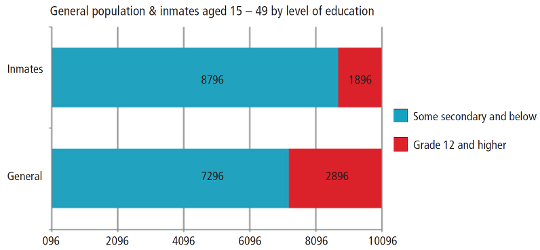Demographic variables influencing criminal engagement, with specific reference to educational disengagement
Background and motivation
The project outline focused on “How South Africa can increase access to formal education of the disengaged informally employed (and unemployed) and their children in order to break the cycle of poverty in an increasing polarization of society?” This research question was based on the assumption that in struggling socioeconomic conditions, career exploration may only be geared toward finding any means of generating income, rather than allowing for the consideration of options. In [1], the authors hypothesized that for unemployed young women the "mothering option" provides a socially acceptable alternative to limited employment opportunities, while their male counterparts might turn to criminal engagement. This research project aims to study criminal engagement by identifying demographic aspects that might contribute to this phenomenon, with specific reference to education, and consequently propose recommendations to alleviate its severity.
Methodology
A quantitative research design using census 2001 data as well as sample data obtained from a maximum security prison in the Free State province of South Africa is incorporated in the study.
Result
Figures 1a and 1b. Population 15-49, Total and inmate population by level of education, South Africa, 2001. Note the higher proportion of the correctional population without completed secondary education compared to the general population.

Conclusion
The research finds that across race, provinces, and other demographic characteristics of the population, the probability of being in a correctional institution is higher for those who have not completed secondary education (matric. level) compared to those who have completed upper secondary level studies.
References
[1] Zikic, J & Hall, DT (2009). Toward a more complex view of career exploitation. The Career Development Quarterly, 28: 181-191.
Supervisors
Petronella Jonck, Faculty of Management, Central University of Technology, Bloemfontein, South Africa
Anne Goujon, World Population Program (POP), IIASA
Note
John Lupwana Kandala of the University of Johannesburg is a South African citizen and was funded by IIASA's South African National Member Organization during the YSSP.
Please note these Proceedings have received limited or no review from supervisors and IIASA program directors, and the views and results expressed therein do not necessarily represent IIASA, its National Member Organizations, or other organizations supporting the work.

CONTACT DETAILS
Principal Research Scholar Exploratory Modeling of Human-natural Systems Research Group - Advancing Systems Analysis Program
Principal Research Scholar Systemic Risk and Resilience Research Group - Advancing Systems Analysis Program
Principal Research Scholar Cooperation and Transformative Governance Research Group - Advancing Systems Analysis Program
Further information

